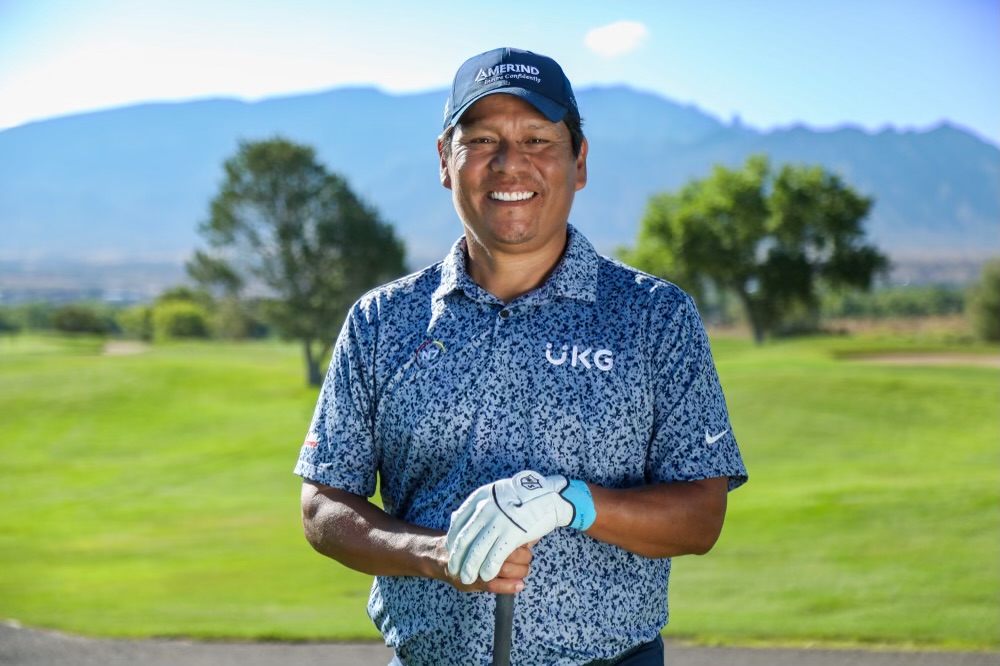
- Details
- By AMERIND
With a dedicated and sincere effort to pursue your passions, you can spark change and empower others to reach their fullest potential.
This is the reality for Notah Begy III, an incredible role model who uses his platform as a professional golfer to make a positive impact on Tribal communities nationwide.
Protecting Our People
Notah partnered with AMERIND because he knows AMERIND understands the unique needs of Tribal entities, and actively contributes to stronger, safer, and healthier Tribal communities. He respects and relates to AMERIND’s mission of being there for Indian Country.
As the country’s only 100% Tribally owned insurance carrier and A- AM Best rated, AMERIND is also committed to strengthening Native American communities and elevating Tribal Sovereignty. We have listened and responded to the unique needs of our People, expanding to offer affordable insurance coverage options for Tribal nations, businesses, and workers.
AMERIND is more than Tribal housing insurance. We offer tailored commercial insurance solutions for Tribes. Our robust Tribal Government & Business Coverage is designed to provide property and liability protection to Tribal governments and business enterprises in Indian Country. Crafted with our first-hand knowledge of Tribal cultures and court systems in mind, our coverage meets the unique needs of Tribal communities at a reduced cost due to our lower expense ratio.
We also offer a Tribal Workers’ Compensation program that allows Tribal entities to maintain sovereignty while keeping Tribal dollars circulating in Indian Country. It is an ideal alternative to conventional, statutory workers’ compensation policies that leave Tribes vulnerable with one-size-fits-all models and potential litigation in state courts under state jurisdiction. Adaptable to your Tribes’ specific needs, we are able to utilize a Tribe’s Workers’ Compensation Law or, in the absence of a Tribal WC Law, our program covers medical expenses, lost wages, death benefits, and permanent disability benefits.
A champion on and off the course
Just like AMERIND, Notah is at the top of his game and is dedicated to working with Indian Country. An enrolled member of the Navajo Nation, he founded the Notah Begay III Foundation (NB3), a non-profit organization that aims to empower Native children by supporting culturally centered programs that foster healthy and active lifestyles within Native American communities. Additionally, he began the Notah Begay III Junior Golf National Championship Series to serve as a platform for junior golfers of all levels to compete and enjoy the game. This yearly event is hosted in collaboration with the Golf Channel, the PGA, and other sponsors.
Notah has raised millions of dollars to support Native youth, families, and organizations. He knows what it means to open the door of opportunity for Tribal communities. That is why he continues to partner with AMERIND and encourages you to do the same.
Teaming up to serve
AMERIND is proud to provide Indian Country with culturally sensitive, affordable, and reliable insurance options. Owned by more than 400 Tribes, you can keep tribal dollars in Indian Country by doing business sovereign to sovereign with AMERIND.
Our story began in a moment of crisis, but AMERIND’s founders believed in a brighter future to protect Indian Country. Today, facing similar challenges with unprecedented inflation and upheaval in the insurance industry, we continue to demonstrate our financial strength. AMERIND, alongside our advocates and partners, will always be there for those who need us.
Together, Notah and AMERIND are a force for good in Indian Country!
Help us defend tribal sovereignty.
At Native News Online, our mission is rooted in telling the stories that strengthen sovereignty and uplift Indigenous voices — not just at year’s end, but every single day.
Because of your generosity last year, we were able to keep our reporters on the ground in tribal communities, at national gatherings and in the halls of Congress — covering the issues that matter most to Indian Country: sovereignty, culture, education, health and economic opportunity.
That support sustained us through a tough year in 2025. Now, as we look to the year ahead, we need your help right now to ensure warrior journalism remains strong — reporting that defends tribal sovereignty, amplifies Native truth, and holds power accountable.
 The stakes couldn't be higher. Your support keeps Native voices heard, Native stories told and Native sovereignty defended.
The stakes couldn't be higher. Your support keeps Native voices heard, Native stories told and Native sovereignty defended.
Stand with Warrior Journalism today.
Levi Rickert (Potawatomi), Editor & Publisher
